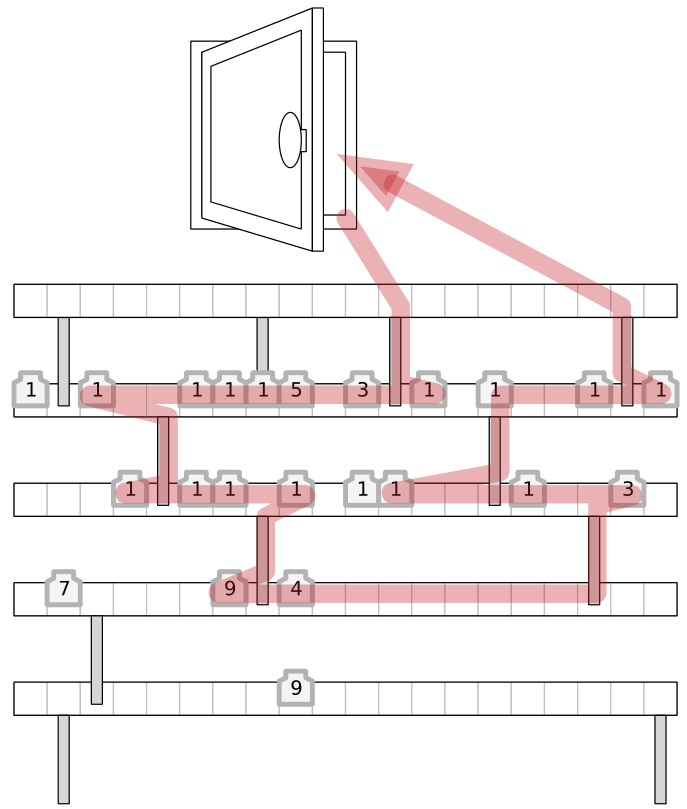ICPC SWERC 2017 I - Burglary
View as PDFThe giant Candy-Bar Wall in the Royal Kitchen is used to store… well, candy bars. These are placed in
jars on equal-length shelves. The shelves are positioned in a vertical progression from the ground
up, and perfectly aligned horizontally on their rightmost and leftmost edges. Each shelf is partitioned
into
equal-sized slots, which can either be empty or occupied by a jar. A jar contains between 1
and 9 candy bars.
Every shelf is connected to the one directly below (or to the floor, for the bottommost shelf) by one or more vertical ladders. A ladder connects a slot to the corresponding slot on the shelf below, or to the floor. There is at most one ladder directly under any given slot.
The topmost shelf does not contain any jars, but just above it there is a huge open window leading to the Royal Kitchen rooftop. Mini-Fierce-And-Hungry Bandit has surprisingly managed to get into the Royal Kitchen via this top window and now plans a massive candy-bar burglary. More precisely, he intends to do a fun-and-profit "round trip" across the wall, that is:
- start from the topmost shelf;
- move down 0 or more shelves, possibly until reaching the floor;
- and then move up again, to the top window through which he will gracefully exit;
while of course grabbing as many candy bars as possible during this trip.
The major issue the bandit faces however is that he cannot enter a slot containing a candy jar more than once, since this would trigger a dreadful Candy Alarm.
Your mission: help the bandit carefully plan his round trip across the Candy-Bar Wall so as to maximize the number of candy bars he grabs, without triggering any alarm.
Input Specification
The first line consists of two integers: (number of shelves) and
(number of slots on a shelf),
separated by a space. The following
lines each consist of strings of length
depicting, in an ASCII
art manner, the shelf and ladder configuration:
- Line
, for
, comprises the characters
-,1, …,9, where a digitrepresents a jar containing
candy bars, and
-denotes an empty slot. - Line
, for
, comprises the characters
.and|, where|represents a ladder, and.means empty wall space.
Constraints
;
;
- there are between 1 and 10 ladders directly under any shelf.
Output Specification
The output consists of an integer on a single line, representing the maximum number of candy bars the bandit can collect without triggering any alarm.
Notes
- Slots corresponding to ladder endpoints may contain jars.
- A slot may be entered either by walking (left to right or right to left) on a shelf, or by reaching the endpoint of a ladder. Slots corresponding to a ladder's endpoints are necessarily entered if the ladder is used.
- There are no candy jars on the topmost shelf and on the floor.
Example

Sample Input
5 20
--------------------
.|.....|...|......|.
1-1--1115-3-1-1--1-1
....|.........|.....
---1-11-1-11---1--3-
.......|.........|..
-7----9-4-----------
..|.................
--------9-----------
.|.................|Sample Output
38
Comments